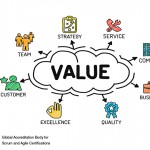How important is Continuous Value Justification in a Scrum Project?
Every project is expected to create some form of business value that outweighs the associated costs
and risks in order for it to be undertaken. But what is business value? And how can one ensure
that the project delivers business value on the expected lines? Business value can be looked at
in financial or non-financial terms such as reduction in costs, increase in revenue, enhancement
in brand value, and increase in satisfaction level among customers, reduction in the number of
complaints, reduction in risks or improvement in organizational capability, etc.
To ensure realization of business value, Scrum relies on continuous value justification. Continuous
value justification refers to assessment of business value regularly to determine whether the
justification or viability of executing the project continues to exist. Business value should be assessed
regularly to determine whether the justification or viability of executing the project continues to
exist. Frequent assessment of investment in the project relative to business value being created
qualifies the continued viability of a project. The expected requirements from the project may
change frequently, which can impact both project investment and value creation.
A key aspect of Scrum is its ability to quickly adjust to chaos created by a rapidly changing business
model. In projects with ambiguous user requirements and significant potential for frequent changes,
Scrum provides considerable advantages over other project delivery models. Monitoring the rate of
delivering value is an important requirement for Scrum projects. Periodically tracking and reporting
the creation of value assists in assessing project status and provides important information to the
customer and other stakeholders. Hence, continuous value justification plays a vital role in the key
decision making processes related to the project.







